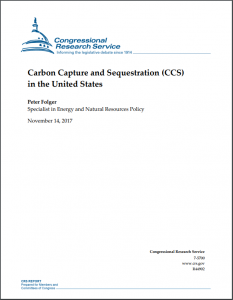Full Title: Carbon Capture and Sequestration (CCS) in the United States
Author(s): Peter Folger
Publisher(s): Congressional Research Service
Publication Date: November 1, 2017
Full Text: Download Resource
Description (excerpt):
Carbon capture and sequestration (or storage)—known as CCS—is a process that involves
capturing man-made carbon dioxide (CO2) at its source and storing it permanently underground.
(CCS is sometimes referred to as CCUS—carbon capture, utilization, and storage.) CCS could
reduce the amount of CO2—an important greenhouse gas—emitted to the atmosphere from the
burning of fossil fuels at power plants and other large industrial facilities.
Globally, two fossil-fueled power plants currently generate electricity and capture CO2 in large
quantities: the Boundary Dam plant in Canada and the Petra Nova plant in Texas. Both plants
retrofitted post-combustion capture technology to units of existing plants. A third fossil-fueled
electricity-generating operation, the Kemper County Energy Facility in Mississippi, was
scheduled to begin CCS operations by now, but cost overruns and delays in construction and
operations led to the suspension of the plant’s CCS component on June 28, 2017.
Each of the power plants using CCS systems may be referred to as a demonstration project, or a
nearly first-of-its-kind venture using technologies developed at a pilot scale ramped up to
commercial scale. Such projects move through many phases, from the initial research and
development (R&D) phase through the final commercial deployment phase. It is not unusual for
projects in the demonstration phase of this process to experience higher-than-anticipated costs,
delays, and other challenges. Several other U.S. Department of Energy (DOE)-supported
demonstration projects, such as FutureGen, the AEP Mountaineer project, and the Hydrogen
Energy California Project, among others, faced challenges that led to their cancellation or
suspension. Given the mixed success of large CCS projects in the United States, the economic
viability of, and the commercial interest in, such projects remains uncertain.
The U.S. Department of Energy has long supported R&D on CCS within its Fossil Energy
Research and Development (FER&D) portfolio. The Trump Administration proposed to cut
FER&D funding substantially in its FY2018 budget request. The Trump Administration’s
proposal differs from the policy trends of the previous two Administrations, which supported
R&D on CCS and emphasized the development of large-scale demonstration projects to evaluate
how CCS might be deployed commercially. Some in Congress have signaled continued support
for DOE’s R&D efforts with respect to CCS. The House Energy and Water Development
appropriations draft legislation would support CCS R&D at a level comparable to that in FY2017,
for example ($635 million versus $668 million enacted for FY2017). The Senate version of the
bill would fund FER&D at $573 million in FY2018, $95 million less than in FY2017 but $293
million more than the Administration request. In addition, some Members of Congress have
continued to introduce legislation in the 115th Congress intended to advance CCS. These bills
include H.R. 2010, H.R. 2011, H.R. 2296, S. 843, S. 1068, S. 1535, and S. 1663. Two of these
bills, S. 1663 and S. 1068, were offered as amendments to tax reform legislation (the Tax Cuts
and Jobs Act) under consideration in the Senate Finance Committee.
The Obama Administration commissioned a CCS task force, which concluded in 2010 that the
largest barrier to long-term demonstration and deployment of CCS technology is the absence of a
federal policy to reduce greenhouse gas emissions. The task force further concluded that
widespread deployment of CCS would occur only if the technology is commercially available at
economically competitive prices. None of those factors appear to be in place currently, which
may indicate that demonstration and deployment of industrial-scale CCS will be delayed
compared to earlier projections, pending future policy, technological, and economic
developments.
